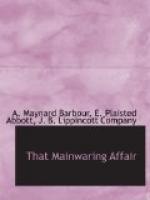“Hush!” interposed Harold Mainwaring; “I know the wrong which has been done you, — they have wronged me, also, far more deeply than you know, — but this is no time or place to recall it!”
The calmness and kindness of his tones seemed to soothe and control his excited companion.
“I know they have wronged you,” the latter replied; “but they have not ruined you! You have not only friends and wealth, but, more than all, your father’s name. I,” he added bitterly, “am a pauper, and worse than a pauper, for I have not even a name!”
For a few moments Harold Mainwaring silently studied the haggard young face confronting him, in which anger was slowly giving place to dull, sullen despair; and his own heart was suddenly moved with pity for the boy.
“Robbed of his birthright before he was born,” reared in an atmosphere of treachery and deceit calculated to foster and develop the evil tendencies already inherited; yet, notwithstanding all, so closely akin to himself.
“Walter,” he said, gravely, at the same time extending his hand across the casket, “I realize the truth of much that you have said, but you need not allow this to ruin or blight your life. Mark my words, your future from this time forth is, to a great extent, in your own hands; your life will be what you make it, and you alone. See to it that it is not blighted by your own wrong-doing! Be yourself a man of honor, and I will assure you, you can depend upon me to stand by you and to help you.” Walter LaGrange raised his eyes in astonishment at these words, containing a pledge of probably the first genuine friendship he had ever known in his young life. He gave a look, searching, almost cynical, into Harold Mainwaring’s face; then reading nothing but sincerity, he took the proffered hand, saying brokenly,-
“Do you really mean it? I supposed that you, of all others, would despise me; and it would be no great wonder if you did!”
“It will depend entirely upon yourself, Walter, whether or not I despise you. If I ever do, it will be the result of your own unworthiness, not because of the wrong-doing of others.”
There were signs in the boy’s face of a brief struggle between the old pride, inherited from his mother, and the self-respect which Harold Mainwaring’s words had but just awakened.
“If it were the other fellow,” he said, slowly, “the one the old man intended to make his heir, had made me such a proposition, I would tell him to go to the devil; but, by George! if you will stand by me, it’s all right, and I’ll be man enough anyway that you’ll never regret it.”
A few days later, Walter LaGrange, penniless and friendless, had disappeared, whither his former associates neither knew nor cared. In a large banking establishment in one of the principal western cities, — a branch of the firm of Mainwaring & Co., — a young man, known as the ward of Harold Scott Mainwaring, was entered as an employee, with prospect of advancement should he prove himself worthy of responsibility and trust. But of this, as of many other events just then quietly transpiring behind the scenes, little or nothing was known.




